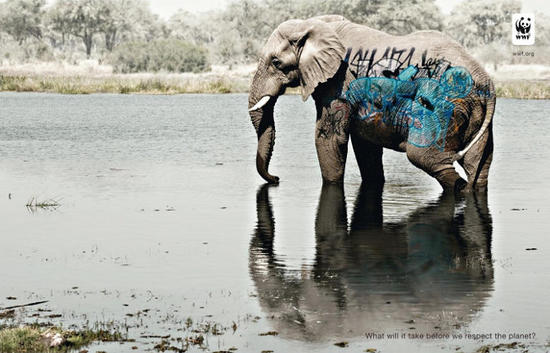This advert created by the WWF
(the World Wide Fund for Nature, not the wrestling lot) shows an elephant
‘tagged’ with graffiti. In the bottom right a single line of text reads “What
will it take before we respect the planet?”. The top right corner shows the
well-known WWF panda logo and website address. The advert combines the concepts
of a run-down, un-cared for Coventry-esque urban area with the growing concern of
extinction surrounding cute, lovely elephants and other endangered wildlife.
The suggestion is that there is no care or respect for Earth’s most vulnerable
species and that they are being forgotten and left unsupported by humanity. But,
more specifically, you. Bet you can’t even remember the last time you donated
to the WWF. You probably did the graffiti. That’s what they’re trying to say,
not me.
The visual element of the advert
uses the contrast technique (Herr, 1986). The vulgarity of the graffiti is
juxtaposed against the elephant which is situated as alone and vulnerable. Who
doesn’t love elephants? Who would draw graffiti on an elephant!? Look at that face. The poor thing has been through
enough. It doesn’t take much to look favourably upon an elephant but to have
such poorly styled graffiti pasted across it by some urban oik is making Dumbo
look pretty good in comparison. If it had been a Banksy it might have been
okay. Added to the fact that to paint that high on an elephant you would have
to park your Ford Ka right up next it, climb on top and then start painting.
The elephant just stood there and took it. Poor elephant.
I guess by now you’re feeling
pretty guilty? Good. Guilt is very influential in getting you to comply (Carlsmith
& Gross, 1969). You’ve probably already got your chequebook out. Some would
say we were placed on this Earth to be stewards of everything on it i.e., it is
our (see; your) responsibility to look after endangered species. Well someone
was slacking if the C0v3ntree Ma55if managed to spray this all over old Nelly
here weren’t they?
Finally, what we’re not seeing here are
the baby elephants frolicking merrily in the lake just out of shot. Why not?
Because good news doesn’t influence you as much as bad news. The WWF have been
around for a long time. Surely by now, and with all the money they’ve been
given over the years they’ve at least had one successful project and managed to
save something. Yes! They probably have! However, if they showed you that
picture you’re much less likely to donate because the negativity effect
(Hodges, 1974) dictates that bad news will influence you more than good news.
It’s “We (you) need to act now” rather than “We (you) need to keep up the good
work”.
Contrast.
Herr, P. M. (1986). Consequences of priming: Judgment and
behavior. Journal of
Personality and Social Psychology, 51
(6), 1106.
Guilt.
Carlsmith, J. M., & Gross, A. E. (1969). Some effects of
guilt on compliance. Journal of personality and social psychology, 11 (3), 232.
Negativity effect.
Hodges, B. H. (1974). Effect of valence on relative weighting
in impression formation. Journal
of Personality and Social Psychology, 30
(3), 378.
James Ulke


I loved this. Written well. If i was being picky id say you could have gone a little more science and a little less humour, but i like humour!
ReplyDeletebeautiful
ReplyDelete